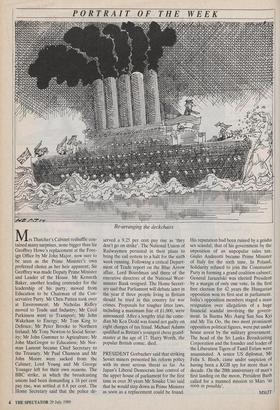PORTRAIT OF THE WEEK
Re-arranging the deekchairs Mrs Thatcher's Cabinet reshuffle con- tained many surprises, none bigger than Sir Geoffrey Howe's replacement at the Fore- ign Office by Mr John Major, now sure to be seen as the Prime Minister's own preferred choice as her heir apparent; Sir Geoffrey was made Deputy Prime Minister and Leader of the House. Mr Kenneth Baker, another leading contender for the leadership of his party, moved from Education to be Chairman of the Con- servative Party. Mr Chris Patten took over at Environment; Mr Nicholas Ridley moved to Trade and Industry; Mr Cecil Parkinson went to Transport; Mr John Wakeham to Energy; Mr Tom King to Defence; Mr Peter Brooke to Northern Ireland; Mr Tony Newton to Social Secur- ity; Mr John Gummer to Agriculture; Mr John MacGregor to Education; Mr Nor- man Lamont became Chief Secretary to the Treasury. Mr Paul Channon and Mr John Moore were sacked from the Cabinet; Lord Young and Mr George Younger left for their own reasons. The BBC strike, in which the broadcasting unions had been demanding a 16 per cent pay rise, was settled at 8.8 per cent. The Home Secretary said that the police de-
served a 9.25 per cent pay rise as 'they don't go on strike'. The National Union of Railwaymen persisted in their plans to bring the rail system to a halt for the sixth week running. Following a critical Depart- ment of Trade report on the Blue Arrow affair, Lord Boardman and three of the executive directors of the National West- minster Bank resigned. The Home Secret- ary said that Parliament will debate later in the year if three people living in Britain should be tried in this country for war crimes. Proposals for tougher litter laws, including a maximum fine of £1,000, were announced. After a lengthy trial the come- dian Mr Ken Dodd was found not guilty on eight charges of tax fraud. Michael Adams qualified as Britain's youngest chess grand- master at the age of 17. Harry Worth, the popular British comic, died.
PRESIDENT Gorbachev said that striking Soviet miners presented his reform policy with its most serious threat so far. As Japan's Liberal Democrats lost control of the upper house of parliament for the first time in over 30 years Mr Sosuke Uno said that he would step down as Prime Minister as soon as a replacement could be found.
His reputation had been ruined by a geisha sex scandal; that of his government by the imposition of an unpopular sales tax. Giulio Andreotti became Prime Minister of Italy for the sixth time. In Poland, Solidarity refused to join the Communist Party in forming a grand coalition cabinet; General Jaruzelski was elected President by a margin of only one vote. In the first free election for 42 years the Hungarian opposition won its first seat in parliament. India's opposition members staged a mass resignation over allegations of . a huge financial scandal involving the govern- ment. In Burma Mrs Aung San Suu Kyi and Mr Tin 0o, the two most prominent opposition political figures, were put under house arrest by the military government. The head of the Sri Lanka Broadcasting Corporation and the founder and leader of the Liberation Tigers of Tamil Eelam were assassinated. A senior US diplomat, Mr Felix S. Bloch, came under suspicion of having been a KGB spy for more than a decade. On the 20th anniversary of man's first landing on the moon, President Bush called for a manned mission to Mars 'as soon as possible'.
MStJT


















































 Previous page
Previous page